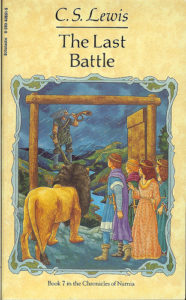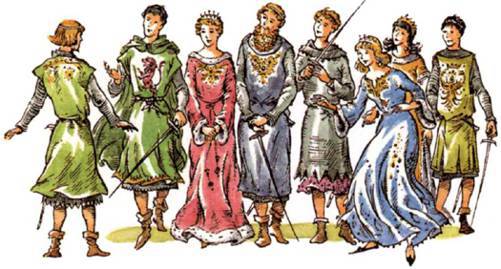It’s been a great C. S. Lewis semester for me: teaching my Lewis course at Southeastern University; enjoying the opportunity to teach his Mere Christianity along with my book, America Discovers C. S. Lewis, at my church every Wednesday evening; and having the privilege of sharing about my book at the Wade Center at Wheaton College.
I don’t take any of this for granted, and I appreciate all the doors the Lord has opened in the last four years since He inspired me to research and write about Lewis during the sabbatical I received from Southeastern.
 Yesterday in the SEU class, we finished reading and discussing The Last Battle, Lewis’s climax to the Narnia series. I chose this one for the students to read because most had already read or were at least familiar with The Lion, the Witch, and the Wardrobe.
Yesterday in the SEU class, we finished reading and discussing The Last Battle, Lewis’s climax to the Narnia series. I chose this one for the students to read because most had already read or were at least familiar with The Lion, the Witch, and the Wardrobe.
Yet there was another reason: the ending of The Last Battle contains one of the most wonderful depictions of the New Earth (even if it is in the fictional world of Narnia) that I have ever encountered. When God wraps up this tragi-comedy that we call “reality,” what will it be like? Lewis gives us a hint.
As all the characters that populated the seven Narnia books (except Susan, sadly) find themselves transported into Life after this life, they are trying to make sense of it all. The Lord Digory explains what has happened:
Listen, Peter. When Aslan said you could never go back to Narnia, he meant the Narnia you were thinking of. But that was not the real Narnia. That had a beginning and an end. It was only a shadow or a copy of the real Narnia which has always been here and always will be here: just as our own world, England and all, is only a shadow or copy of something in Aslan’s real world.
You need not mourn over Narnia, Lucy. All of the old Narnia that mattered, all the dear creatures, have been drawn into the real Narnia through the Door. And of course it is different; as different as a real thing is from a shadow or as waking life is from a dream.
Jewel the Unicorn captured it as well when he realized that he had “come home at last. This is my real country,” he proclaimed. “This is the land I have been looking for all my life, though I never knew it till now.”
There’s a reason why we can see beauty around us on this earth, yet long for more. As Jewel concludes, “The reason why we loved the old Narnia is that is sometimes looked a little like this.” And our tired old earth, regardless of being marred by man’s sin, nevertheless retains hints of the Reality that awaits us.
The final page of The Last Battle offers us a revolution in our thinking about death that is worth quoting in full:
Lucy said, “We’re so afraid of being sent away, Aslan. And you have sent us back into our own world so often.”
“No fear of that,” said Aslan. “Have you not guessed?”
Their hearts leaped and a wild hope rose within them.
“There was a real railway accident,” said Aslan softly. “Your father and mother and all of you are—as you used to call it in the Shadowlands—dead. The term is over: the holidays have begun. The dream is ended: this is the morning.”
And as He spoke He no longer looked to them like a lion; but the things that began to happen after that were so great and beautiful that I cannot write them.
And for us this is the end of all the stories, and we can most truly say that they all lived happily ever after. But for them it was only the beginning of the real story.
All their life in this world and all their adventures in Narnia had only been the cover and the title page: now at last they were beginning Chapter One of the Great Story which no one on earth has read: which goes on forever: in which every chapter is better than the one before.
If that doesn’t send a thrill up your spine, you’re not paying attention to the words. I look forward to getting past the title page and entering into the Great Story that goes on forever, and I am convinced, as Lewis says, that every chapter will be better than the one before.

